Composer Profiles
William Harris
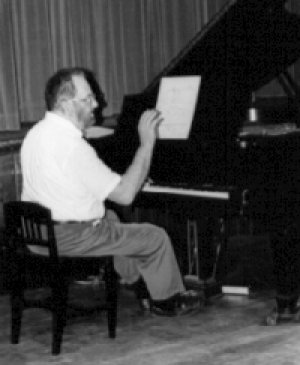 William Harris
William Harris
Listen to this show
 |
William Harris
 for the composer's expanded homepage at Middlebury College.
for the composer's expanded homepage at Middlebury College.
 for the composer's comments on improvisation, in RealAudio3 format, 1:56/229K. (RA2/14.4 version)
for the composer's comments on improvisation, in RealAudio3 format, 1:56/229K. (RA2/14.4 version)
 for "Music for the Day and the Year", an essay.
for "Music for the Day and the Year", an essay.
 for "On Analysis", an essay.
for "On Analysis", an essay.
 for "Soundpieces 2: A Brief Look", an essay.
for "Soundpieces 2: A Brief Look", an essay.
 for "Personal Music in an Impersonal Age?", an essay.
for "Personal Music in an Impersonal Age?", an essay.
 for "Music and the Nine Deadly Perils", an essay.
for "Music and the Nine Deadly Perils", an essay.
 for "Music as Ambiance, Music as Mind", an essay.
for "Music as Ambiance, Music as Mind", an essay.
 for "Brain and Mind: A discussion of some of the modes of the thought processes", an essay.
for "Brain and Mind: A discussion of some of the modes of the thought processes", an essay.
 for "Metrics in Music and Poetry: The Cramping of Free Expression and Talent", an essay.
for "Metrics in Music and Poetry: The Cramping of Free Expression and Talent", an essay.
 for "The Kryptic World of Mind Drawing", an essay.
for "The Kryptic World of Mind Drawing", an essay.
 for "Improvisation: The New Spirit in the Arts", an essay.
for "Improvisation: The New Spirit in the Arts", an essay.
 for RealAudio5 version of Improvisation No. 3 from Woodstock Festival, 1:29/209K (RA2/14.4 version)
for RealAudio5 version of Improvisation No. 3 from Woodstock Festival, 1:29/209K (RA2/14.4 version)
 for TrueSpeech version of Improvisation No. 3, 93K
for TrueSpeech version of Improvisation No. 3, 93K
 for MPEG-2 version of Improvisation No. 3, 987K.
for MPEG-2 version of Improvisation No. 3, 987K.
 for access to The Romulus Project
for access to The Romulus Project
William Harris:
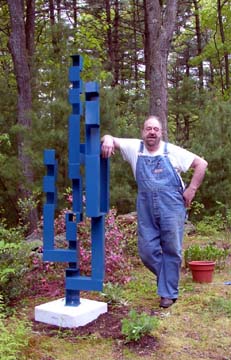 William Harris with his sculpture
William Harris with his sculpture
I grew up outside of New York, when Flushing looked like a small town with fine old houses from the Civil War period, some dirt streets, and a grade school of brick which looked more like a Reformatory than an academy. The US Artillery gave me the European Tour, then Harvard in Classics and PhD in Linguistics, which led to Walla Walla, Stanford and finally Middlebury teaching Greek and Latin, and a variety of other things like Buckminster Fuller, marble carving, music improv., Finnegan's Wake, etc.
I now have time to follow my persistent thread of music, which dates from the age of eight, when one Friedrich Schlieder demonstrated annually to piano teachers in the New York area how important it was to teach kids music theory, as against pushing buttons in response to seeing black spots on white paper. Once a year he appeared with an acolyte, with whom he played startling improvisations on things like Three Blind Mice. I got the idea immediately and have never stopped making my own music. In my college days it was my own pan-tonal in ignorance of Ives and Schoenberg, later I veered into Baroque improvisation which taught me the importance of voices as against chords, and the possibility of keeping three or even four voices going on the piano, or later the harpsichord. But I knew this should not be the end, sold the harpsichord which was always tempting me, and in the last dozen years have moved into my own polyphonic, pan-tonal mode.
Present work is improvised, recorded on the graphic window of Performer to be tweaked and switched, then built into multiple tracks with transposition, re-phasing, inversion, augmentation and diminution of course, and even retrograde to be used carefully. This is all moving along well, but it looks as if the final product must be tape, since I won't score for what won't or can't be played. But there are other playable pieces too ... studies for one hand sounding like two, small pieces with lots of space, to encourage listening to new sounds.
WIth continued good health I may even get a good deal of this done.
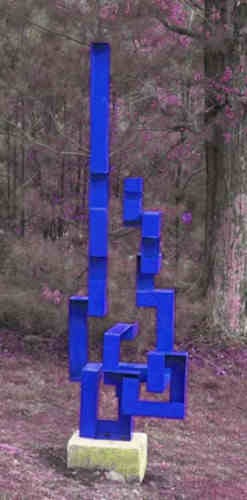
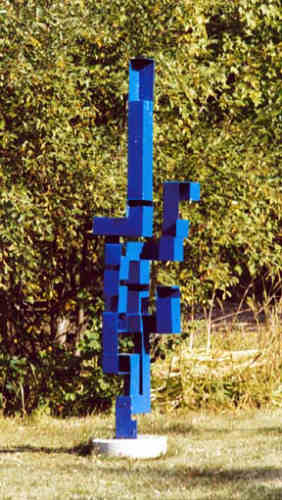
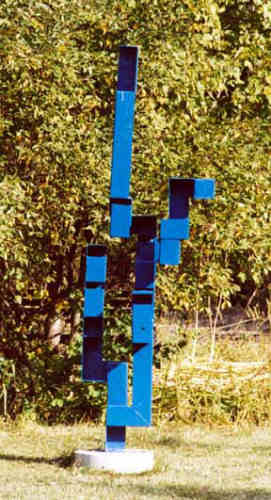
To reach the composer:
Online:harris@middlebury.edu
By telephone: +1-802-388-6624
By physical mail: RR 1 Box 205A, Shoreham, Vermont 05770-9801


 William Harris
William Harris
 William Harris with his sculpture
William Harris with his sculpture

